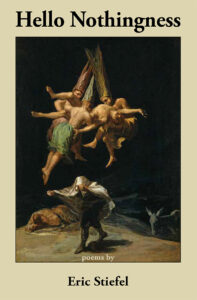 Today’s special guest is poet Eric Stiefel and we’re chatting about his new chapbook, Hello Nothingness.
Today’s special guest is poet Eric Stiefel and we’re chatting about his new chapbook, Hello Nothingness.
Bio:
Eric Stiefel is a poet and critic living in Athens, Ohio with his dog, Violet. He teaches at Ohio University, where he is a PhD candidate. His recent work has appeared or is forthcoming in Apple Valley Review, Prism Review, Painted Bride Quarterly, The Journal, Frontier Poetry, and elsewhere, and his debut poetry collection, Hello Nothingness, is forthcoming from Main Street Rag at the end of 2022.
Welcome, Eric. What do you enjoy most about writing poems?
For me, writing poetry often comes from a place of inquiry. Most of my poems begin as an inkling of an image or an interesting phrase that I’ve jotted down in my notes. Eventually, when I’ve taken enough notes, these phrases and images start to coalesce into an idea that’s worth exploring further. So I’d say that my favorite part about writing poetry is the surprise that comes when a new poem starts to take shape, along with the excitement that comes with molding that shape into a more realized form.
Can you give us a little insight into a few of your poems – perhaps a couple of your favorites?
I take a great deal of inspiration from art across mediums in my work, and so I appreciate spaces in my poetry that allow for moments of communication with artists whose work has inspired my own. The first poem of the collection, “Lest,” actually started as a response to the famous “You must change your life” at the end of Rainer Maria Rilke’s “Archaic Torso of Apollo,” as the poem takes on the task of trying to illustrate the speaker’s life—or the way the speaker sees the world—in a lyrical mode of thinking.
Another poem in the collection, called “In a Moment,” showcases some of the existentially fraught aspects of the collection, as the poem starts by getting lost in a daydream and searching for some kind of meaning in the hazy crevices of memory, only to be startled out of that daydream by an incident in the present. There’s also a playful undercurrent of repetition in the poem, which is a tool I often use when trying to navigate more serious subject matter across the collection as a whole.
What form are you inspired to write in the most? Why?
Almost everything that I write is in free verse, with the odd sonnet or two thrown in when I think I can get away with it. But I try to think of every poem I write as having their own nonce forms, which all come with their own aesthetic and rhetorical conditions.
What type of project are you working on next?
I’ve been working on and submitting Hello Nothingness for about five years at this point, which means that I’m in the process of learning what it feels like to not have a project at the moment, though I’ve already started working on a handful of poems that feel like the beginning of something new.
When did you first consider yourself a writer / poet?
I became very serious about the idea of becoming a novelist when I was around ten or eleven years old, though I gave all of that up a few years later after reading Larry Levis, Louis Gluck, and Li-Young Lee.
How do you research markets for your work, perhaps as some advice for not-yet-published poets?
If I’m being honest, I’ve used all sorts of different methods to try to find journals or publishers who might be interested in my work, but, the truth is, the only pattern I’ve been able to identify was that I sent in the right work to the right person at the right time.
With that in mind, I submit my work broadly, to as many journals as I think might be interested, and to just as many that seem like long shots. Poets & Writers has a great database on their website, Submittable has a great database with upcoming deadlines, and Literistic has both free and paid newsletters with upcoming opportunities.
The biggest piece of advice I’d give to not-yet-published poets would be to keep submitting; most literary journals accept less than five percent of submissions, which means that even poets with “good” submitting averages often receive more rejections than acceptances.
What would you say is your interesting writing quirk?
I don’t believe in writer’s block, and, at some point when I was a stubborn teenager, I decided that I should be able to write a poem no matter where I was. So I’ve written poems everywhere from subway benches to saltwater ferries to logs on the sides of hiking trails.
As a child, what did you want to be when you grew up?
There was a time when I wanted to be a lawyer, though I’m now a poet, which is probably one of the furthest things one can become from a lawyer.
Anything additional you want to share with the readers?
For me, verse offers a mode of communication outside of the boundaries of prose or everyday speech. Poetry is most exciting to me when it breaks rule or other arbitrary barriers to get to the core of what it’s trying to say. The poet Marcus Jackson once told me that every good poem should have at least one line that would startle a stranger if you told it to them on the street, which is my favorite thing anyone has ever told me about poetry. So my advice would be to let your poems be the beasts that they are without trying to tame them, at least until you understand them first. There’s often great beauty and insight in the heart of the untamed.
Thank you for being here today, Eric!
